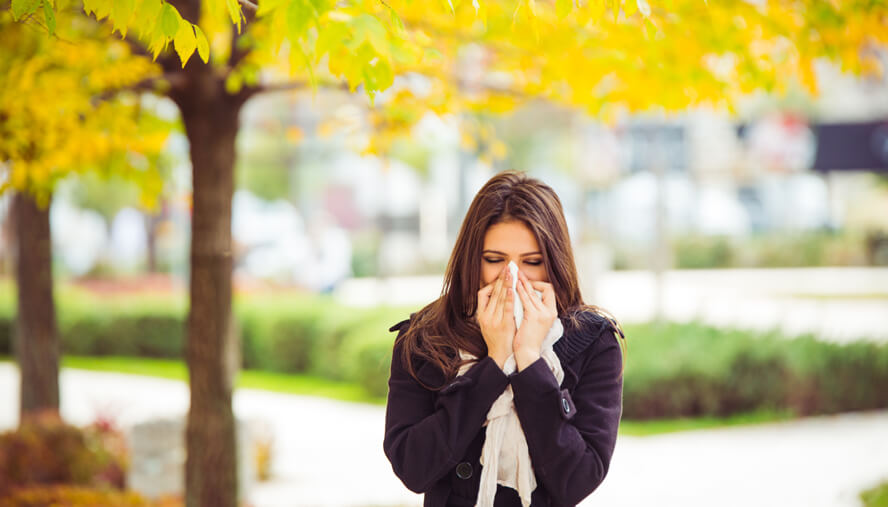Finding Relief from Fall Allergies
DENVER, CO —
Fall is a fun time of year, but for many people it is full of allergy triggers that make their breathing problems worse. From leaves and hay to moldy pumpkins and smoky bonfires, hazards are lurking. The biggest fall culprits are weeds and molds that can lead to nasal congestion, runny nose, sneezing and itchy, watery eyes.

“The end of summer is not necessarily a time of allergy relief for many people. Up to 75 percent of spring allergy sufferers are also allergic to weed pollens, especially ragweed, which pollinate during the fall months,” said Carah Santos, MD, pediatric allergist with National Jewish Health for Kids. “Additionally, fall is ripe for mold to be found in areas where common and popular outdoor activities abound.”
Ragweed pollen can travel up to 400 miles, causing allergy symptoms for those nowhere near the plant. Meanwhile, mold spores thrive in damp outdoor spaces and can be found in jack-o-lanterns, corn mazes, piles of leaves, hay rides, apple orchards and playground mulch.
Dr. Santos offers the following tips to deal with fall allergies:
Go early and late. Try to avoid going outside and keep windows closed from late-morning to mid-afternoon when weed pollen counts are highest.
Wash away pollens immediately. When you return indoors from raking leaves, exercising or fall outings, immediately shower and change clothes to wash away the allergens from your skin, hair and clothes.
Cover up. If you’re particularly sensitive, wear a mask when raking leaves or using a leaf blower.
Prepare for colder weather. Before turning your heater on for the first time this season, clean the vents and change your air filter to remove mold or other allergens that may be been trapped over the summer.
Be mindful of other irritants. For those with asthma, various irritants from particulate matter in bonfire smoke, wood fireplaces and stoves, and dust collected from stored blankets can be triggers for an asthma attack.
National Jewish Health is the leading respiratory hospital in the nation delivering excellence in multispecialty care and world class research. Founded in 1899 as a nonprofit hospital, National Jewish Health today is the only facility in the world dedicated exclusively to groundbreaking medical research and treatment of children and adults with respiratory, cardiac, immune and related disorders. Patients and families come to National Jewish Health from around the world to receive cutting-edge, comprehensive, coordinated care. To learn more, visit njhealth.org or the media resources page.
Media Resources
We have many faculty members, from bench scientists to clinicians, who can speak on almost any aspect of respiratory, immune, cardiac and gastrointestinal disease as well as lung cancer and basic immunology.
Media Contacts
Our team is available to arrange interviews, discuss events and story ideas.
- Jessica Berry
303.398.1082 office
303.807.9491 mobile
berryj@njhealth.org - Adam Dormuth
303.398.1002 office
970.222.5034 mobile
dormutha@njhealth.org
